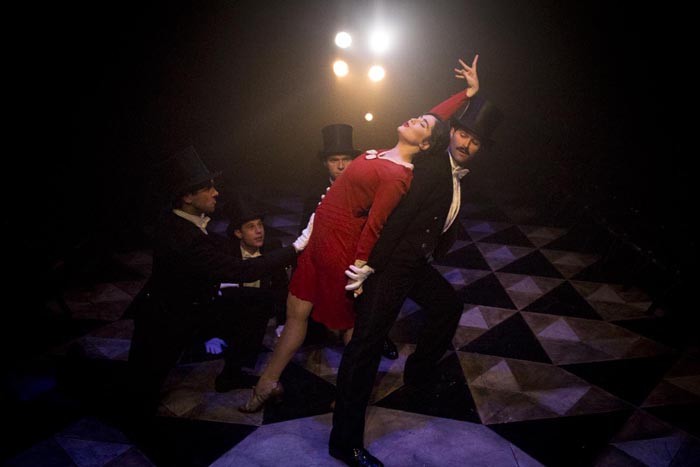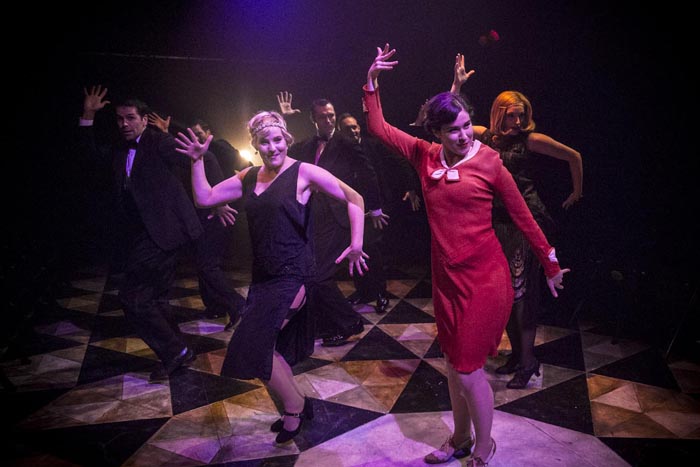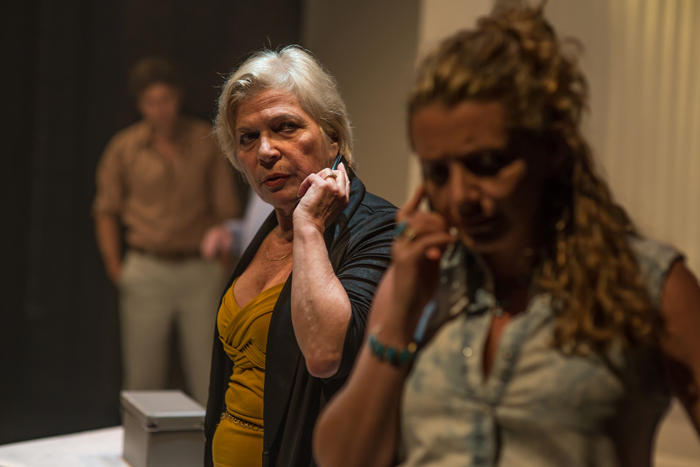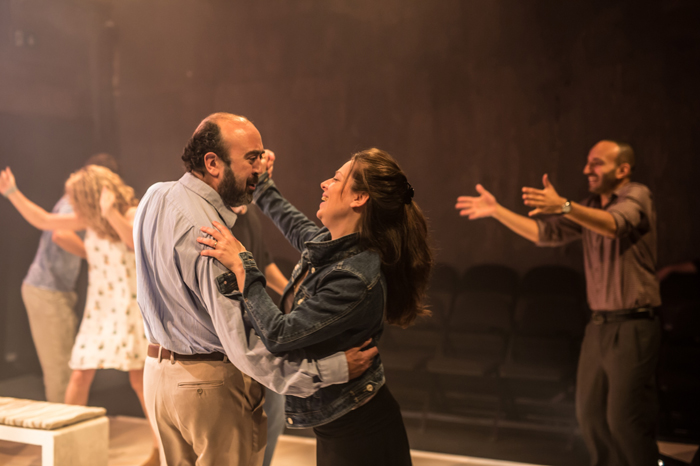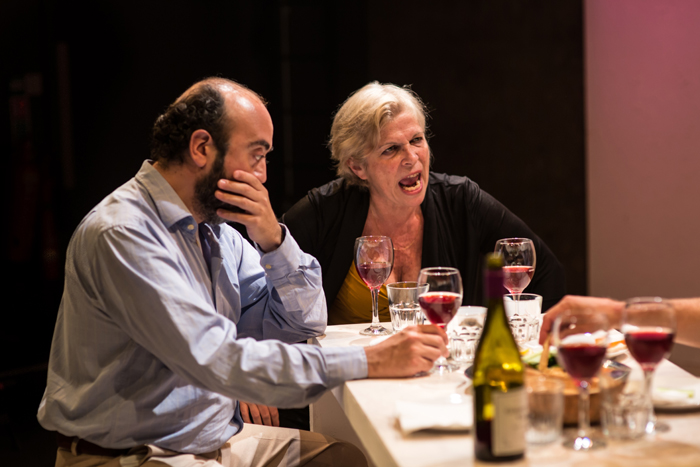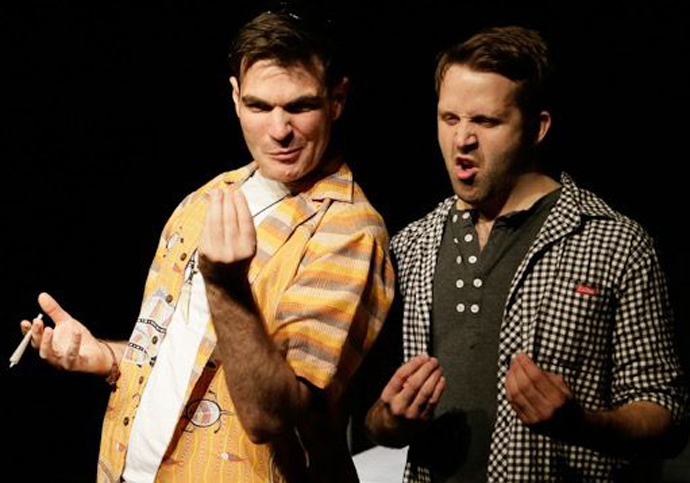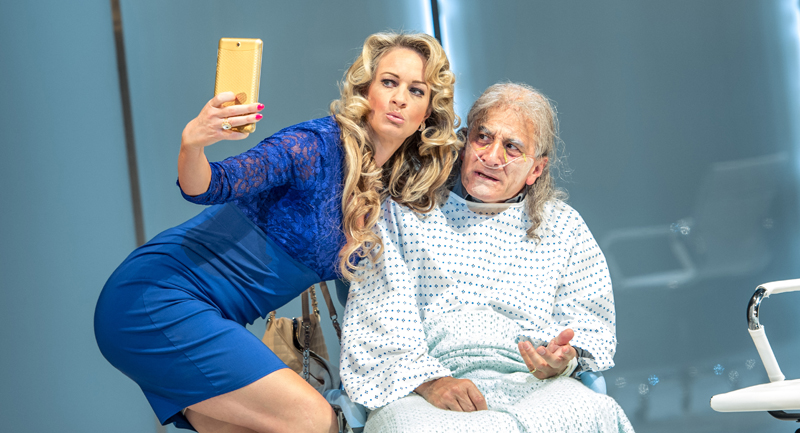 It’s been years since Patrick Marber has written for the theatre, so it’s good to be able to report that on his return he has scored a triumphant hat trick. Already the author of hugely successful plays Dealer’s Choice and Closer (both premiered at the National Theatre), as well as being scriptwriter and a performer with Steve Coogan on the TV hit Alan Partridge, Marber is now reconquering London's National Theatre. He's written a football drama, The Red Lion, has directed his own adaptation of Turgenev’s A Month in the Country – now Three Days in the Country – and he's worked as a dramaturg on subtly streamlining George Farquhar’s glorious Restoration comedy, The Beaux’ Stratagem (pictured above). You can see The Beaux' Stratagem in cinemas from Thursday 3 September as part of NTLive, but read our reviews of all three right here in one place.
It’s been years since Patrick Marber has written for the theatre, so it’s good to be able to report that on his return he has scored a triumphant hat trick. Already the author of hugely successful plays Dealer’s Choice and Closer (both premiered at the National Theatre), as well as being scriptwriter and a performer with Steve Coogan on the TV hit Alan Partridge, Marber is now reconquering London's National Theatre. He's written a football drama, The Red Lion, has directed his own adaptation of Turgenev’s A Month in the Country – now Three Days in the Country – and he's worked as a dramaturg on subtly streamlining George Farquhar’s glorious Restoration comedy, The Beaux’ Stratagem (pictured above). You can see The Beaux' Stratagem in cinemas from Thursday 3 September as part of NTLive, but read our reviews of all three right here in one place.
The Beaux Stratagem ★★★★★
Irish playwright George Farquhar sets The Beaux’ Stratagem in the city of Lichfield and there’s something especially attractive and intimate about the way Marber and director Simon Godwin realise that provincial setting. The rackety beaux Aimwell and Archer have fled London to escape gambling debts and seek their fortunes, preferably through marriage to money. At each coach stop they take it in turns to don the guise of master and servant and in Lichfield it is Aimwell’s turn to play the elegant gentleman and Archer’s to serve as equally well-turned-out man. There are nice twists in Farquhar’s tale. Unsurprisingly the pair of hopefuls light on Dorinda, a delightful and attractive unmarried heiress, but there’s an equally tempting prospect, the vivacious Mrs Sullen trapped in a loveless marriage to Dorinda’s aptly-named boorish brother. Samuel Barnett’s Aimwell and Geoffrey Streatfield’s Archer are attractive and resourceful (almost) rogues – and of course they prove honourable in the end. They also prove they can cut a very pretty caper – Streatfield almost stops the show. Susannah Fielding and Pippa Bennett-Warner make a pair of lively and intelligent, independent-minded gentlewomen, clearly more than a match for any man who dares enter their lives. Not to give too much away, Farquhar has an innovative take on the chances of separation of consenting parties in a loveless marriage, which would have gone against the law of the times, but which actually chimes pretty well with the Jewish divorce process, the get.
Although the delicious amatory encounters and negotiations between these four are at the heart of the action, there’s an intriguing parade of well-drawn characters from various strata of society, all with their own agendas in a series of cleverly linked sub plots. Farquhar’s well-drawn characters are wonderfully brought to life by a superb cast under Godwin’s spot-on direction. Timothy Watson’s French officer, a prisoner-of-war enjoying his provincial confinement, and Jamie Beamish’s Foigard, a dodgy "French" priest betrayed by his Irish twang, ensure that the comedy mounts. Chook Sitain’s Gibbet is as rascally a highwayman as his name suggests, ably abetted by henchmen Hounslow and Bagshot (note the place names) Mark Rose and Esh Alladi. Lloyd Hutchinson is expansive as mine host and Amy Morgan luscious and resourceful too as his daughter Cherry. And gorgeous Molly Gromadzki manages to be comically sultry as the equally well-named ladies’ maid Gypsy.
Godwin has a fine eye for stage pictures on designer Lizzie Clachan’s evocative, versatile two-storey set, playing both inn and country house. Her stunning costumes glimmer and swish, especially to movement director Jonathan Goddard’s exhilarating measures. MD Richard Hart’s terrific ensemble play and everyone sings Jonathan Goddard’s gorgeous music (which pays subtle tribute to Farquhar’s Irish origins) and the whole production is extraordinarily inclusive and life-enhancing. It should work especially well in cinemas too. Highly, and warmly, recommended.
The Beaux' Stratagem runs until Sunday 20 September. 7.30pm & 2pm. £15-£35. National Theatre, South Bank, SE1 9PX; 020 7452 3000. www.nationaltheatre.org.uk
The Red Lion ★★★★
Before the final whistle (apologies in advance, it’s hard to resist the football terminology), Marber skilfully heads his own winner into the goal. I’m not the biggest fan of the beautiful game, though I’m married to one avid Arsenal supporter and the mother to another. Both consented to take their (supportive) football widows to this one and I for one was a bit apprehensive. At times the language is as colourful as I’m warned it is on the terraces, so do also be aware if you’re easily shocked by certain four-letter words. Like Marber’s hugely successful earlier play Dealer’s Choice, football here is the gateway into exploring the (male) relationships of an inwardly-focused self-selected group.
The Lions are hardly a legend in their own half time – a down-at-heel South of England soccer club, their glory days long gone. Backstage in the dressing room, Yates the kit-man is an ex-star player, hanging on in there, devoted to the game and the team, win or lose. Manager Kidd walks the walk and talks the talk of strategy on and off the pitch, but in reality he knows he too is hanging on by his fingertips. Then suddenly the prospect changes completely with the advent of a possible saviour in the lithe and muscled form of young Jordan, surely a future star that any club would fight to sign. The older men do battle for him, each seeing him as a chance for reflected glory. Do they simply want to take him under their wing or does either of them have a dodgier endgame? As a committed Christian, Jordan would probably deplore being referred to as saviour – but are his own tactics entirely ethical?
It’s fascinating to watch the seesaw of the power struggles between the older pair over the younger man. The shifting balance of power between three men in an enclosed space is sometimes reminiscent of Harold Pinter’s The Caretaker. Here you are always aware of the world of the pitch – and of the management – just outside the dressing room door.
All three actors perform well in this game. Peter Wight’s Yates and Daniel Mays’ Kidd are not afraid to "let it all hang out" so we see the difference between the bodies of the older men and the younger, extraordinarily fit (in all senses of the word) Jordan, played by Calvin Demba. Mays has an wonderfully mobile face and can roll his eyes for England. He commands sympathy for his predicament, just as he evokes a measure of disgust for his tactics – and his loud mouth. But Wight is just great at making you think he is all altruism and bluff kindliness, while suggesting he too has something to hide. And Demba truly is (relatively anyway) the promising newcomer in a totally convincing performance, both physically and emotionally. Watching him handling a ball I could almost appreciate the poetry and exactly why the game is deemed beautiful. In the end it’s not just a case of youthful idealism set against the more cynical pragmatism of the older men and it is both all the more delicate and demanding for that.
The Red Lion runs until Wednesday 30 September. 8pm & 3pm. £15-£55. National Theatre, South Bank, SE1 9PX; 020 7452 3000. www.nationaltheatre.org.uk
Three Days in the Country ★★★★

Marber’s adaptation of Turgenev’s great play also takes place in the provinces, this time on a country estate in 19th-century Russia, home of another ill-matched pair, Arkady the landowner and his wife Natalya. Marriage intrigues are in the air here too and although for some it’s just a matter of negotiation for practical gain of wealth or securing companionship, in a febrile atmosphere it seems almost every woman young enough to attract his attentions has fallen for Belyaev, new tutor to the couple’s young son Kolya.
Natalya’s tempestuous, illicit passion for the young man contrasts with her 17-year-old ward Vera’s fresh, idealistic first love and the fiery, straightforward sexuality of Katya, the maidservant. Natalya has her own long-standing admirer, Rakitin, stoically bearing the burden of his unrequited love. And Vera has attracted the attention of Bolshintsov, a rich neighbour, who is patently too old for her. Add Shpigelsky, the family doctor with his own marital aspirations, and Lizaveta, companion to Arkady’s doughty mother Anna, a feisty spinster resigned to taking snuff to dull the exquisite ennui of her life, and Kolya’s elderly German tutor Schaaf, and you have the full complement of lives in this seemingly quiet Russian country landscape. You could say nothing much happens and in the end the status quo simply shifts a little – or that the emotional landscape is subtly altered by the end, so there is no going back.
Either way it’s hard not to warm to Marber’s own funny, emotionally intelligent production with lovely performances all round and some real stand-out performances. It’s hard to understand how Natalya can be blind to the quiet charisma of John Simm’s Rakitin. Mark Gatiss proves his comic versatility and timing in spades as self-confessed rather bad physican Shpigelsky. He’s perfectly matched by Debra Gillet’s drily intelligent, quietly witty Lizaveta in a wonderfully unorthodox wooing scene, the funniest in the production, which has the audience rocking with delighted laughter. The night I saw the production, understudy Cassie Raine got well-deserved extra applause, standing in for an indisposed Amanda Drew.
Marber’s production on Mark Thompson’s clever set, evoking both the enclosed lives in this landscape and the vistas beyond, has characters sit erect and listening in on high-backed chairs at the back of the stage when they are not taking part in a scene – suggesting also that there is no privacy on an estate that depends on the interlocking lives of masters, mistresses and servants. We see only the tip of the iceberg, but landowner Bolshitsov declares that he has at least 320 serfs on his estate. The revolution, though, is not even a cloud on the horizon. There is also an intriguing red door that at first is flown behind and above the action, but as yearnings descend into demonstrations of physical passion, so it descends to ground level so that they can take place in a deceptive privacy that it actually barely affords, thanks to those intent watchers behind it.
Three Days in the Country runs until Wednesday 21 October. 7.30pm. £15-£55. National Theatre, South Bank, SE1 9PX; 020 7452 3000. www.nationaltheatre.org.uk
By Judi Herman






